2022 Orientation: Environment, Sustainability & Community Health
Angelica B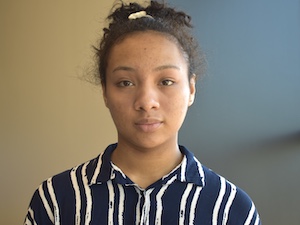 rooks | Farm Alliance of Baltimore
rooks | Farm Alliance of Baltimore
This week’s orientation affirmed my enthusiasm for the hardworking summer ahead of me. The aspect of orientation that challenged me most was working, communicating, and completing activities with people I have never met prior. On the first morning of orientation, I was apprehensive about sharing my experiences with brand new people. I am generally not someone who makes a conscious effort to speak to unfamiliar faces, but I was challenged all week as I constantly interacted with new people. However, this was also the aspect that I enjoyed the most. By the end of the orientation week, it was bittersweet to transition into getting ready for my placement work because I began to build meaningful bonds with people in my peer mentor group as well as the 2022 cohort in general. At the end of the week, I realized that in spite of everyone having a different placement, everyone shared the common value of wanting to genuinely serve the greater Baltimore community. It is rare to be associated with so many like-minded people, and I will think of the connections I recently made as I form more connections at work this summer.
Additionally, I enjoyed hearing from former CIIP members that graduated in past years. It’s hard to think of the implications of CIIP when I am just embarking on the journey. However, the guest speakers that graduated were able to shine light on their perspectives. They showed that the CIIP internship is not just a summer long event, but that there are connections, lessons, and values that you carry with you for the rest of your life. It was also interesting to see that a lot of the past CIIP members went on to continue non-profit work, even if it did not directly correlate to the placement that they had. It was nice to hear that CIIP equips you with valuable experiences that you are able to translate into whatever field you desire.
Siena DeFazio | Jo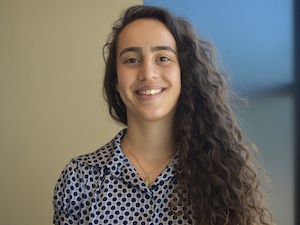 y Wellness
y Wellness
I felt challenged at orientation by the amount of vulnerability required over what sometimes felt like a continuous amount of time. I feel we have grown accustomed to doing work that shuts off our personality as students. We have to write papers that purposefully remain as objective as possible. Emotions do not have a place in academic writing. And most of the jobs available to undergrads are limited to menial data entry tasks or front desk work. All of these do have opportunities to expose a vulnerable part of your self for moments to strengthen an argument or even to just motivate you to keep going. For example, I am a research assistant for a project on increasing the efficacy on COVID policies for schools. It is extremely repetitive, but I know what I am doing has purpose. Thus, I allow my self to be emotional as a motivator.
Orientation, on the other hand, felt like a continuous stream of talking about emotions. I loved the conversations I had and being able to hear from others about their hopes, fears and beliefs. However, at the end I felt so exacerbated. I had to find ways to rejuvenate my self for the next by spending time alone outside on my hammock and falling back on my meditation routine.
My favorite aspects of orientation have been the relationships I formed with others. Specifically, I really enjoyed the alumni panel because I myself have been wondering where CIIP fits in my future and hearing from all of them about where they are now was really inspiring. I feel especially strongly that my relationships that I made within and beyond my peer mentor group will last even past this Summer.
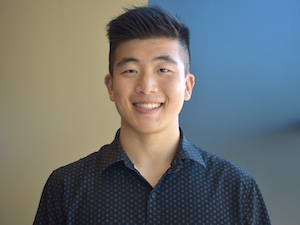 Jeremy Gu | Baltimore Squashwise
Jeremy Gu | Baltimore Squashwise
What challenged you about orientation? What aspects did you particularly enjoy? Why?
Orientation was really fun! I had just come back from a relaxing stay back home in Pittsburgh and was ready to explore Baltimore and learn a whole bunch. And it is an understatement to say CIIP did just this. My view of Baltimore started off with just the Hopkins bubble and has grown tremendously through listening to the presentations and exploring Baltimore. Most importantly, through my learning experience, I also had fun and built new friendships!
Our week started off with a presentation on the history of Baltimore’s segregation: the white L and the black butterfly. Lane Victorson was actually a really interesting speaker who brought up a whole bunch of pieces of history I previously hadn’t considered. I thought his explanations of the heroism, asset-based thinking, and services vs. helping made a lot of sense. They bring a lot more meaning and direction to how I’m going to approach my internship. I think the main thing I will do is to really listen to my supervisor and the 2 other organization people as well as all the youth I’ll be serving. I know that their stories and experiences have shaped how they will grow and my job will be to support them in however way they want.
Interestingly, Lane’s final story of the starfish and the little kid who kept trying to save them all challenged me most that day. As I listened to the rest of the speakers, I kept on wondering, what do we actually do about the starfish. Do we support the figure at the end who sees the starfish getting washed up as a natural cycle of life, knowing that helping or not helping all result in the same sight next year? Or do we support the kid and make little differences together even though we will have to do it again next year and the year after that, all because we know a difference was made for those starfish that we did save?
I’m going to aim to keep on thinking about this question throughout this Summer and see if I can put together some sort of answer.
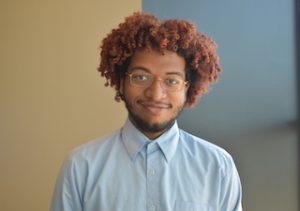 Brahein Richardson | Black Church Food Security Network
Brahein Richardson | Black Church Food Security Network
What challenged me about orientation was the orientation itself. It started off as an interruption to the normal routine I had become accustomed to for the past 2-3 weeks after the spring semester and finals ended. It challenged me to get up and find motivation. Orientation certainly put me in a place where I felt uncomfortable and even vulnerable at times. Personally, I have been a very shy and introverted person my whole life, and I prefer to avoid situations that put me in a place I have never been. Especially in a room full of strangers with people who I don’t know and with people who maybe already know each other, people who’ve never interacted with me and might not understand all of the little nuances that come with being my friend. And all at the same time, I was asked to intentionally be thoughtful and vulnerable in a room full of people I have never met, and I will admit that it was very challenging for me to feel uncomfortable but push myself to not hide and fall back. Another way orientation challenged me was through starting the beginnings of unlearning many of the stereotypes this city and its people, specifically black people and other minorities, are marked with. Orientation challenged me, because it put me in a place where I was no longer the expert, it put me in a place where it was my turn to listen, not be right or be wrong, but simply listen. Additionally, I particularly enjoyed the many presentations about fun events and things to do in Baltimore, as well as the many history lessons comprising Baltimore resident’s relationship with the city’s past and present. These presentations from the start began to clean the lenses of my glasses that I viewed Baltimore through. I felt like I was able to obtain a better understanding of the hardships that Baltimore residents have faced and overcome, and I appreciate them more now. For most of my life at Hopkins, I have yet to venture outside of the metaphorical yet fiercely evident bubble that surrounds the Homewood campus, and I enjoyed getting to know this city more through orientation because I now recognize more that this city has to offer. I will admit that I was one of those people who ignorantly labeled Baltimore as boring, but I was too quick to speak and not keen enough to listen. My favorite presentation was the “Fun Things to do in Baltimore” and I plan on exhausting it of things to do this summer (: !
 Herrinee Senthilkumar | MissionFit Inc
Herrinee Senthilkumar | MissionFit Inc
Orientation week was so amazing! I honestly had no idea what to expect but I was blown away by the amount that I learned, the inspiring speakers I got to hear from, and by my incredible peers in this cohort and the insightful conversations we’ve had. Of all the empowering speakers we got to hear from, one presentation, in particular, has remained vividly in the back of my mind every day since: Jessa’s presentation. There were SO many new things I learned from them.
I am a little embarrassed to admit this but I had never actually heard of the White L and Black Butterfly prior to Jessa’s presentation. I, of course, was previously aware of the university’s parasitic relationship with the city and that many families were evicted and their homes demolished as Hopkins continued to expand. However, I had no idea of the magnitude of Hopkins’s role as a bulldozer (both metaphorically and literally) that has continuously taken so much from this city. Before coming to Hopkins and even in my first two semesters here, I would often hear people say (often lightly or in a joking or exaggerating manner) how “everyone (meaning the rest of the city) hates Hopkins” but I never really understood why. Now I am beginning to understand the depth of this justified hatred. Part of me feels shame and guilt for all the ways in which Hopkins has inflicted disruption and caused pain and struggle for many generations of Baltimoreans.
Another very important topic of Jessa’s presentation and a recurring topic of discussion throughout this past week that has stuck with me is the “savior complex” and being very conscious about how I, as a Hopkins student, may be perceived as I step outside of the Hopkins bubble and into an unfamiliar community to be of service. This is one of those topics that seemed obvious to me when I heard about it, but again, I am a little embarrassed to admit, had never really thought about until now. One of my biggest fears for this summer and for any other kind of volunteering or community service that I do in the future is that I’ll be perceived as intruding, walking in with my own agenda, or having a “savior” attitude. I don’t want to help or fix, rather I want to serve (something we discussed in my peer mentor group). And to this end, there are many things we talked about this week that I will apply this summer and going forward that will fulfill this intention:
1. LISTEN more than I speak.
2. Center THEM (the community/organization that I’m serving) and their needs above all else. This means doing whatever THEY need and whatever they ask of me.
3. Focus on and embrace the assets of the community I’m serving, not the deficits.
4. People are the experts of their own lives.
5. Think about how I can make my relationship with this community/organization sustainable (i.e. not just 8 weeks or 4 years).
These are concepts that I have been turning over in my head all week and probably will continue to for the rest of my life. Reflecting on orientation week and just sitting with all the many things that I’ve learned, I feel much better equipped and informed to start my internship with MissionFit this summer. I feel ready to focus, work hard, and be intentional and purposeful with the work that I will be doing.
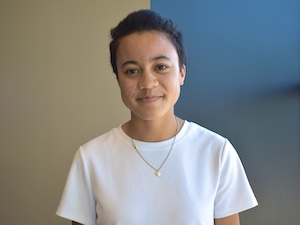 Marisa Thomas | Whitelock Community Farm
Marisa Thomas | Whitelock Community Farm
Through orientation I’ve been further challenged to think about my assumptions and motivations in service. In my personal reflection, two concepts that have especially challenged my thought patterns are saviorism and privilege.
I had heard about saviorism before and thought I had challenged it in myself, but orientation led me to think about how saviorism might still be lingering. In our conversations about privilege, I started to think about how my perception of my educational, class, and racial privilege might be inadvertently creating the wrong mindset for service. I started thinking that my ego might have warped my understanding of my privileges into some type of saviorism (and it’s something I’m still thinking about now). My peer mentor brought up a quote during one of our reflections about the difference between three words: helping, fixing, and service. I wish I could remember the exact wording and who said it, but the idea was that thinking of community work as helping and fixing is still rooted in ego. Although I do have privileges and experiences due to my education and economic upbringing, that does not mean I am better equipped to address problems. I think I’ve learned that I really need to start challenging the “authority” that is supposedly granted with formal education/class. (Even the term “formal education” sticks out to me now – the word formal seems to grant certain types of education more value). I don’t want to complete discount it because the “authority” is real in the access that it gives people to money, knowledge, and connections needed to operate in our current system, but grassroots actors certainly hold a lot of knowledge, power, and agency on their own. They have authority in their own lives, and having privileges in general should not grant those with privileges more authority in other people’s decisions.
The knowledge and experience of grassroots organizers was something that I knew, but it was like a fact I could tell someone, not something I had internalized. In the case of food apartheid (another new term I learned!), I might have said “there have always been people working in community gardens to combat food insecurity,” but another part of me would think that there was something fundamental missing in the processes that I could help with. Something in my subconscious that said I would somehow see something different. That thinking is wrong, and I’m glad that it was challenged. Maybe the academic environment in which I’ve trained myself to compete and succeed has led some part of my self-confidence to stem from comparison with others. As a result, I may think I need to be different or correct or somehow better to be confident in my work and what I’m able to offer. No matter the root, I don’t like the way it led me to a “what can I do to solve this” perspective on service (and in general). I’m really glad orientation has led me to more intentionally think about how I show up to work that has been going on for generations. My goal is to learn as much as I can from the people with the experiences. Maybe I will be able to offer ideas and apply certain skills, and I can definitely offer my labor and work ethic, but ultimately it will be really important for me to listen and to embrace not having the answers.
